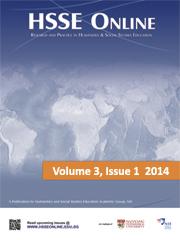Leading Classroom Discussions About Population Policy in Singapore
Introduction Iconic American singer-songwriter Johnny Cash recalled in song a boyhood experience of watching his parents monitor flood conditions at their 1937 Dyess, Arkansas, home

A Note from the Editors
It has almost become a cliché to claim that the humanities subjects are integral to education for young people. While many people pay lip service to the importance of subjects such as history, geography, and social studies, in practice, this is not been consistently reflected in the actions and choices of educators, policy makers, parents, and students in Singapore and elsewhere. Thus it is timely that this issue includes an article written by Mark Baildon reminding us of how the humanities subjects are essential for the well-being of both the individual and society.
Anecdotal and empirical evidence suggest that teachers frequently deem these subjects to be too challenging for weaker students. As teacher educators, we have heard too many teachers proclaim that this content or these skills are too difficult for their students and make claims that their students will, for example, not be able or willing to engage in thought-provoking inquiry activities or tasks. These deficit views seem to shape the pedagogical choices of these teachers and as a result, students may be presented with a severely limited and simplified version of the curriculum. Linda McNeil calls this kind of teaching, “defensive teaching,” and this, she argues, has negative implications for the kind of education these students (who are frequently less privileged) have access to.
We argue that it is important for all teachers to be advocates for a powerful and equitable humanities education program in schools. Teachers need to be conscious of the intent of the curriculum, be convinced of its worth in promoting the well-being of the individual and society, and to take active steps to challenge deficit views or negative stereotypes of their students.
Li-Ching Ho
Mark Baildon
Editors, HSSE Online
May 2014
Introduction Iconic American singer-songwriter Johnny Cash recalled in song a boyhood experience of watching his parents monitor flood conditions at their 1937 Dyess, Arkansas, home
Siew Fong Ng (National Institute of Education (Singapore)) Oi Khum Karen Chan (Punggol View Primary School) Keywords Social Studies Economics Primary School Teacher Education Introduction In this
Copyright Sustainability Learning Lab 2022 – All Rights Reserved